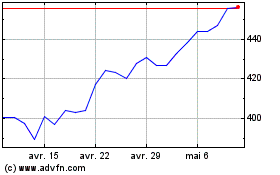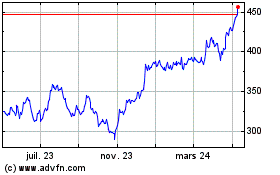Goldman Promises Greater Scrutiny of Senior Executives Following 1MDB Settlement
23 Octobre 2020 - 3:06AM
Dow Jones News
By Dylan Tokar
When Goldman Sachs Group Inc. first came under scrutiny for its
dealings with Malaysian development bank 1Malaysia Development Bhd.
or 1MDB, the investment bank was adamant: The alleged bribery
misconduct was the fault of rogue employees, according to former
chief executive Lloyd Blankfein.
By the time of its blockbuster $2.9 billion settlement with
authorities in the U.S. and elsewhere on Thursday, the bank was
singing a different tune.
Following the settlement, the bank announced an unusually broad
set of bonus clawbacks and pay cuts to current and former
executives, including Mr. Blankfein. Goldman's board released a
statement calling the matter "an institutional failure."
Central to the Justice Department's case was the repeated
failure of Goldman's compliance and internal control functions to
properly investigate the involvement of a corrupt Malaysian
financier who was involved in the 1MDB bond offerings underwritten
by the bank.
Mr. Blankfein and others at Goldman for years blamed the scandal
on a pair of senior bankers who were criminally charged in the
matter, Timothy Leissner and Roger Ng. The two circumvented the
firm's internal controls to work with financier Jho Low to secure
business from 1MDB, the bank said.
Yet fault for the misconduct, and the continued dealings with
Mr. Low, extended beyond Messrs. Leissner and Ng, according to
Goldman's agreement with the Justice Department.
The bank's control functions vetted Mr. Low in 2009 and refused
to onboard him as a client. Mr. Leissner kept trying, prosecutors
said. He and others later worked with Mr. Low to underwrite three
separate bond offerings for 1MDB worth more than $6.5 billion.
Although the bank's control functions suspected Mr. Low's
participation in the bond offerings, they repeatedly failed to do
anything other than ask members of the deal team whether he was
involved, prosecutors said.
Mr. Leissner denied Mr. Low's involvement and the oversight
functions accepted his denial, doing little else to investigate the
matter, they said. Prosecutors specifically faulted the control
functions with failing to review the electronic communication of
deal team members for concrete evidence of Mr. Low's
involvement.
The settlement documents portray a business environment where
compliance officers and other institutional checks had little power
to override high-profile bankers or lucrative investment deals.
In one email cited by prosecutors, executives in the bank's
control functions discussed the disparity between how certain deals
were vetted and the unusual latitude given to certain employees
such as Mr. Leissner.
"Yes, double standard, and it looks stupid," one unnamed
executive said.
Goldman on Thursday reached coordinated settlements with the
Justice Department, the U.S. Securities and Exchange Commission,
the Federal Reserve and the New York State Department of Financial
Services, and with foreign authorities in the U.K., Hong Kong and
Singapore. In July, it agreed to pay $2.5 billion to the government
of Malaysia.
As part of the settlements, the firm agreed to continue
overhauling its compliance and oversight functions. Goldman on
Thursday released a seven-page statement outlining completed and
ongoing enhancements.
Since the 1MDB transactions eight years ago, its compliance
department has nearly doubled in size, Goldman Chief Executive
David Solomon said.
Many of the enhancements outlined are standard best practices
for a firm such as Goldman, according to Bruce Searby, a former
federal prosecutor. Mr. Searby said the reforms appeared to give
the compliance functions and others within the firm greater power
to vet risky deals.
"What they are faulting Goldman for is not having enough
barriers to the deal team pushing back on the compliance team," he
said. "At least under some circumstances, you cannot simply accept
the denials of your own people."
Among the changes made or proposed by the investment bank is an
increased scrutiny on senior employees who are involved in
high-risk areas of business. The bank says it has developed a
program to conduct in-depth reviews of senior employees and
reviewed its process for approving their travel and entertainment
expenses.
The changes force executives to take on a more personal role in
oversight, said Michael Weinstein, a partner at Cole Schotz PC who
serves as chair of the firm's white collar litigation and
government investigations practice.
"The people that were handling deals in [the 1MDB case] seemed
to be at such a high level that no one questioned what they were
doing," he said. "They are saying, 'We can't let that happen
anymore.'"
Write to Dylan Tokar at dylan.tokar@wsj.com
(END) Dow Jones Newswires
October 22, 2020 20:51 ET (00:51 GMT)
Copyright (c) 2020 Dow Jones & Company, Inc.
Goldman Sachs (NYSE:GS)
Graphique Historique de l'Action
De Mar 2024 à Avr 2024

Goldman Sachs (NYSE:GS)
Graphique Historique de l'Action
De Avr 2023 à Avr 2024
